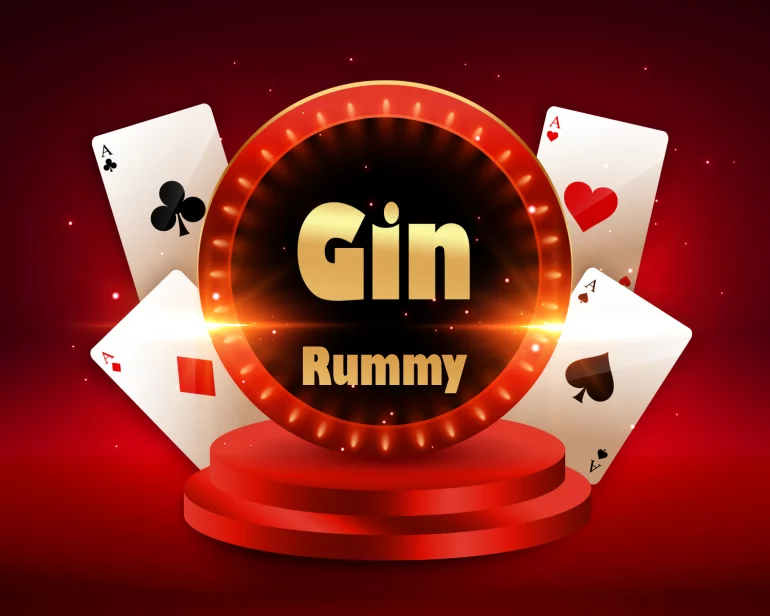Perhaps you have not heard of such a card game. However, it does not mean that you can not play it. In some countries, possible variations of rummy games are often referred to as "Bridge," although they have very little in common with the actual game of Bridge. Generally, rummy games are popular globally, inferior to poker and blackjack.

General Rules of Jin Rummy
Any variation of rummy is based on the task of the players to get rid of all the dealt cards.
This happens by placing certain combinations on the table.
- At the beginning of each turn, the player draws a new card from the deck and takes the card discarded by the previous player.
- In the end, he dumps one of his cards, even if it is necessary to form a combination.
- When the deck runs out, the cards from the discard tray are shuffled and used again in the game.
Each round of the game finishes when one of the players places all his cards on the table in the form of a combination. The score of the set cards is a positive balance, and the deadwood points form a negative balance.
A standard table is usually formed. It shows the outcomes of each round, and the player with the necessary score becomes the winner.
If you play for money, the calculation is made after each round according to the fixed bet or number of points.
Combinations in Rummy
Card combinations in rummy are sets of three or more consecutive cards of the same suit or three or four cards of the same rank.
In addition, if the player has one or more cards that can improve an opponent's combination placed on the table, he can do it by putting them during his turn. In some versions of this game, it is only possible to do it at the end of the round.
Gameplay in Gin Rummy
This version is the most popular of all rummy games. Gin rummy was created in the nineteenth century by a New Yorker who enjoyed gin and named the invented game in honor of it. The rules are very similar to the standard rules for this group of games, but they differ in a few nuances to speed up the gameplay.
A standard 52-card deck is used to play this game. All players whose number can reach two to four receive ten cards. The upper card in the deck is placed face up and serves as the first discarded card.
- An ace is worth one point.
- Face cards are scored at 10.
- The other cards are equal to their numerical values.
The player becomes a winner if they go gin or knock. After this, points are calculated for winning and losing.
The player goes gin if he has placed all the cards in the form of melds on the table. In this case, he receives a bonus of 25 points.
The player may knock if his number of deadwood points does not exceed ten. After that, the opponents can lay off the cards, depending on the combinations of the other player. This situation is called an undercut. This allows them to reduce deadwood. Moreover, if one of the contestants has a lower number of points, the knocker will get 25 penalty points and not become a winner.
The game typically continues until one player reaches a predetermined score. At the same time, additional bonuses and penalty points may be established for various game situations.
Gin Rummy Basic Strategy
The core playing strategy revolves around rapidly forming sets of three or four cards of the same rank (e.g., three 7s) or runs of three or more cards in the same suit (e.g., 4, 5, 6 of Hearts) while keeping your deadwood count low.
When you draw a card from the stock or the discard pile, you should aim to use it to complete a meld, advance a potential meld, or at least keep a low point value.
Discarding involves getting rid of the highest-value unmatched cards, typically 10-point face cards and Aces, unless they are part of a potential meld.
A good strategic goal is to keep your deadwood count consistently under 10 so you are ready to knock before your opponent, or be in a strong position to achieve Gin.
Where to Play Jin Rummy
Jin Rummy is by no means the most popular online casino game of chance. However, it has many fans, and various software providers offer Jin Rummy for them. You can usually learn the rules and practice for free. Of course, there is also a real money rummy game mode.
Some well-known and reputable online casinos are listed below.
Personal Experience
I played a lot of gin rummy with friends - sometimes even for money. I have never played this game in a casino. There are websites where you can play rummy for money, but I don't have that experience.
Do you know how to play Jin Rummy? Have you ever played Jin Rummy for money? What were your successes? Share your experiences and give Casinoz readers tips in the comments.












